Friends, if you’re seeking ‘Bible verses About Consuming Alcohol,’ this content is for you. Today, I share Bible verses that will help you better understand Consuming Alcohol according to the Bible. Let’s explore what the Word says about Consuming Alcohol.
What Does the Bible Say About Drinking Wine?
Wine has been a part of biblical culture for centuries, woven into celebrations and daily life. But what does the Bible really say about drinking wine? It’s important to understand the context and intention behind these scriptures. Wine is often mentioned in the Bible, sometimes as a symbol of joy and blessing and other times with caution. Let’s look at some key verses that shed light on this topic.
Ephesians 5:18 – Be filled with the Spirit
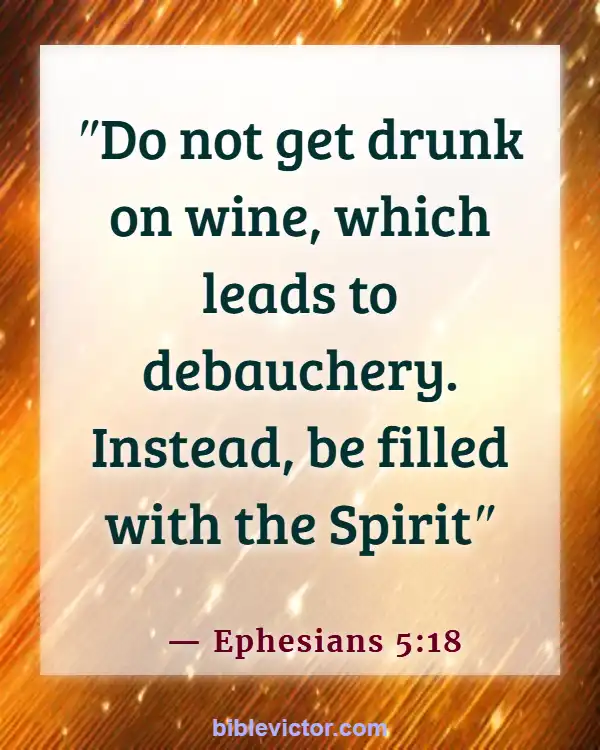
Do not get drunk on wine, which leads to debauchery. Instead, be filled with the Spirit
Ephesians 5:18
Ephesians 5:18 advises against excessive drinking, which leads to reckless behavior, and instead encourages believers to be filled with the Holy Spirit. This verse highlights the importance of spiritual fulfillment over physical indulgence.
Proverbs 20:1 – Wine leads to mockery
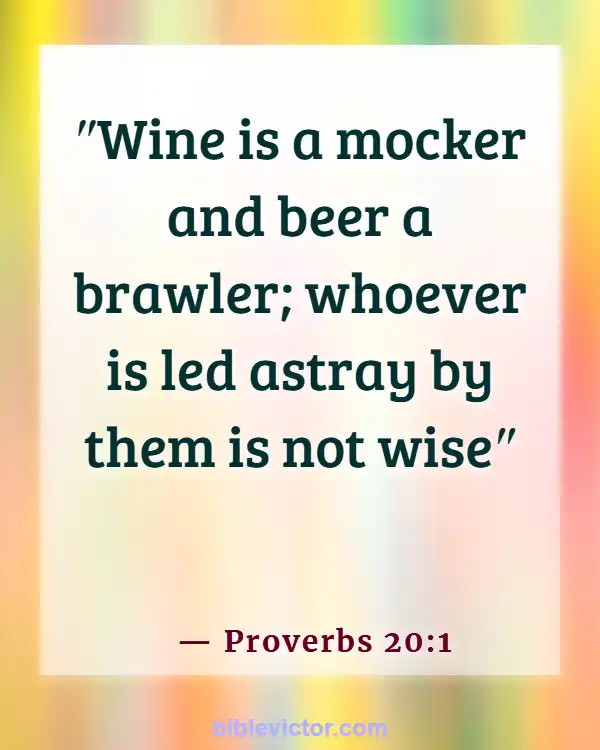
Wine is a mocker beer a brawler;
whoever is led astray by them is not wiseProverbs 20:1
Proverbs 20:1 warns that wine leads to mockery and strong drink to brawling, highlighting the potential for alcohol to impair judgment and cause reckless behavior. It serves as a caution against excessive drinking and its consequences.
1 Timothy 5:23 – Use wine for health reasons
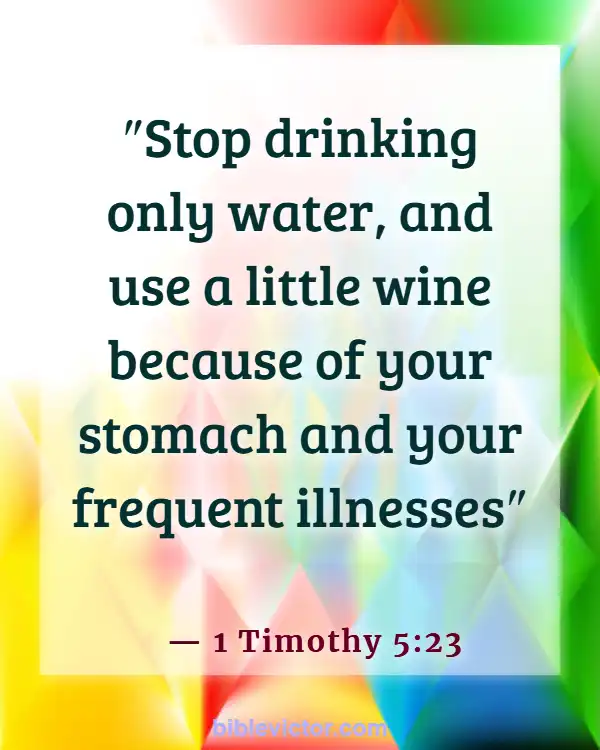
Stop drinking only water, use a little wine because of your stomach your frequent illnesses
1 Timothy 5:23
1 Timothy 5:23 advises using wine for health benefits, suggesting moderate consumption for medicinal purposes. It highlights a practical approach to alcohol, focusing on its potential benefits rather than advocating for excessive drinking.
Ecclesiastes 9:7 – Enjoy life, drink with joy
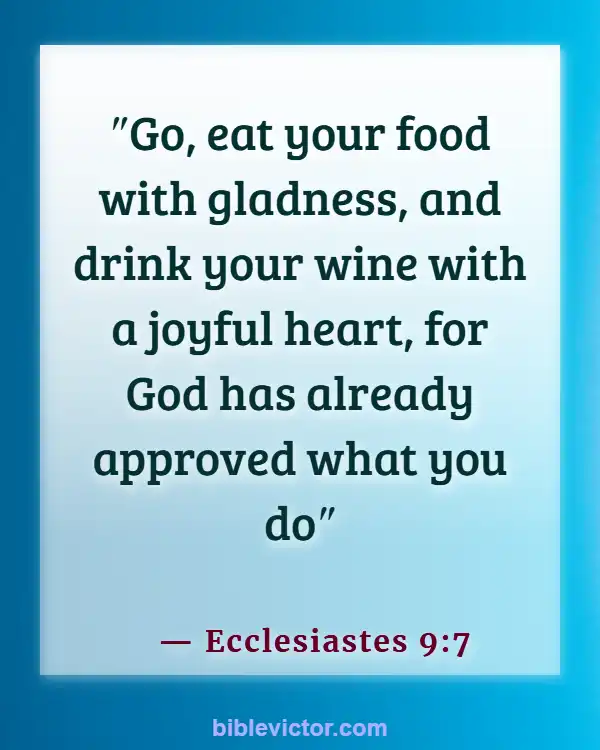
Go, eat your food with gladness, drink your wine with a joyful heart, for God has already approved what you do
Ecclesiastes 9:7
Ecclesiastes 9:7 encourages enjoying life’s simple pleasures, like drinking wine, with a joyful heart. It suggests that responsible enjoyment of wine is part of a life blessed by God, aligning with biblical wisdom on moderation.
Isaiah 55:1 – Invitation to spiritual nourishment
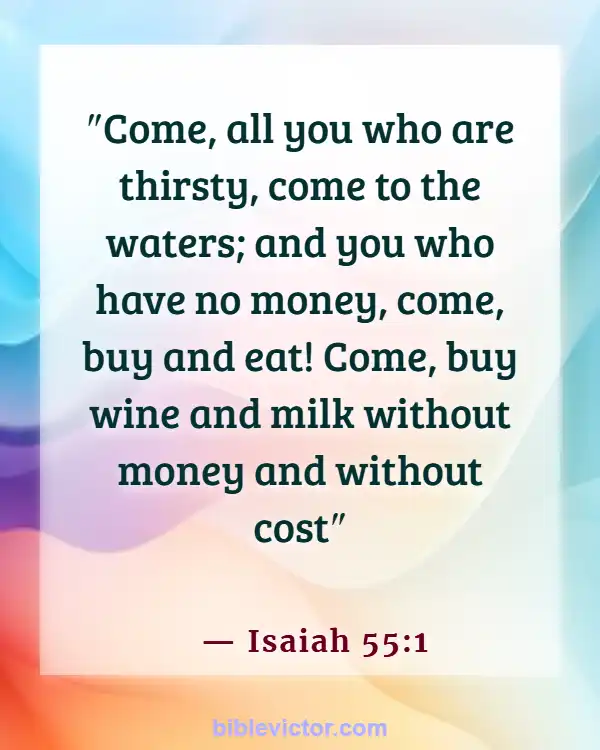
“Come, all you who are thirsty,
come to the waters;
you who have no money,
come, buy eat!
Come, buy wine milk
without money without costIsaiah 55:1
Isaiah 55:1 invites us to seek spiritual nourishment and fulfillment in God, contrasting worldly desires like alcohol. It emphasizes the abundance and satisfaction found in God’s provision, surpassing temporary pleasures.
Psalm 104:14-15 – Wine gladdens human hearts
He makes grass grow for the cattle,
plants for people to cultivate—
bringing forth food from the earth:
wine that gladdens human hearts,
oil to make their faces shine,
bread that sustains their heartsPsalm 104:14-15
Psalm 104:14-15 highlights the provision of God, noting that wine gladdens human hearts. It suggests that consuming wine is a gift from God meant to bring joy, but it should be enjoyed responsibly and in moderation.
Is Drinking Alcohol a Sin According to Scripture?
Many people wonder if drinking alcohol is a sin. The Bible doesn’t label drinking itself as sinful, but it does encourage moderation and self-control. It’s important to reflect on our motivations and the impact of our choices. Drinking can be a part of life, but it should never lead us away from a life that honors God. Let’s explore what the scriptures say about this issue.
1 Corinthians 10:31 – Do all to God’s glory
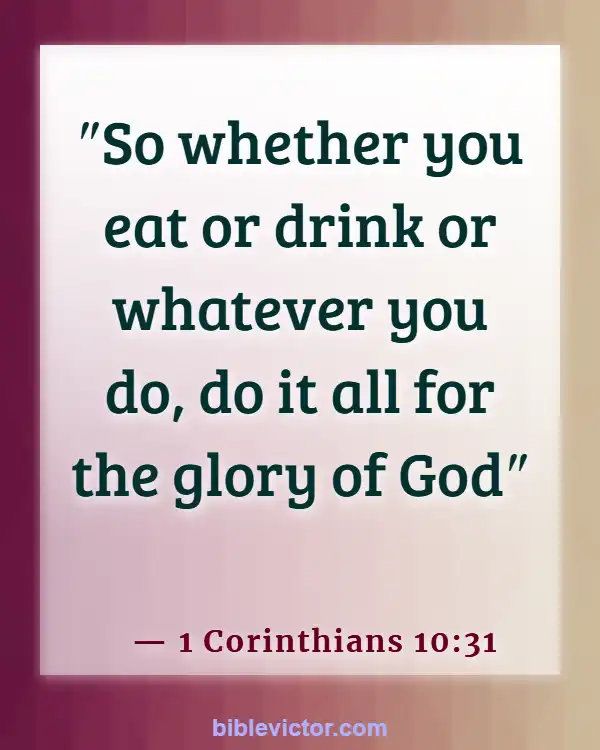
So whether you eat or drink or whatever you do, do it all for the glory of God
1 Corinthians 10:31
1 Corinthians 10:31 emphasizes doing everything for God’s glory, including consuming alcohol responsibly. The verse suggests that drinking isn’t inherently sinful, but believers should ensure their actions honor God and reflect their faith.
Romans 14:21 – Avoid causing others to stumble
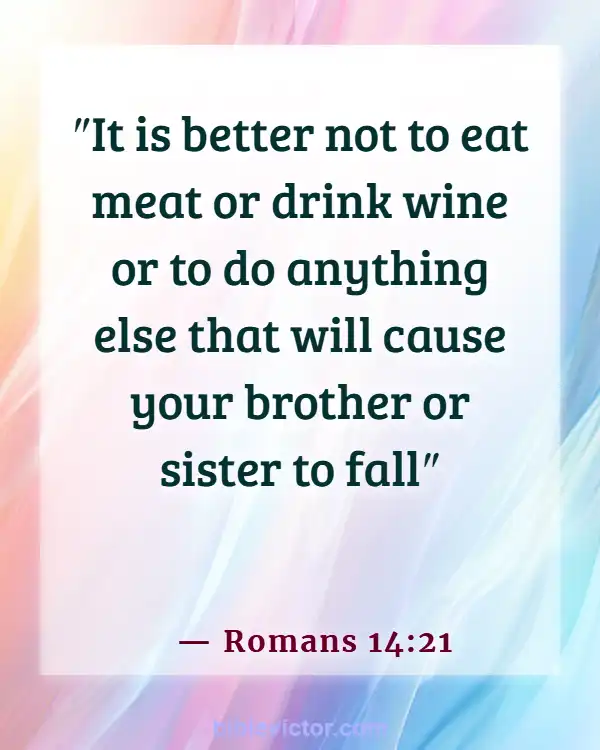
It is better not to eat meat or drink wine or to do anything else that will cause your brother or sister to fall
Romans 14:21
Romans 14:21 advises believers to avoid actions, like drinking alcohol, that may cause others to stumble in their faith. It emphasizes being considerate of others’ convictions and fostering a supportive community.
Galatians 5:19-21 – Acts of sinful nature listed
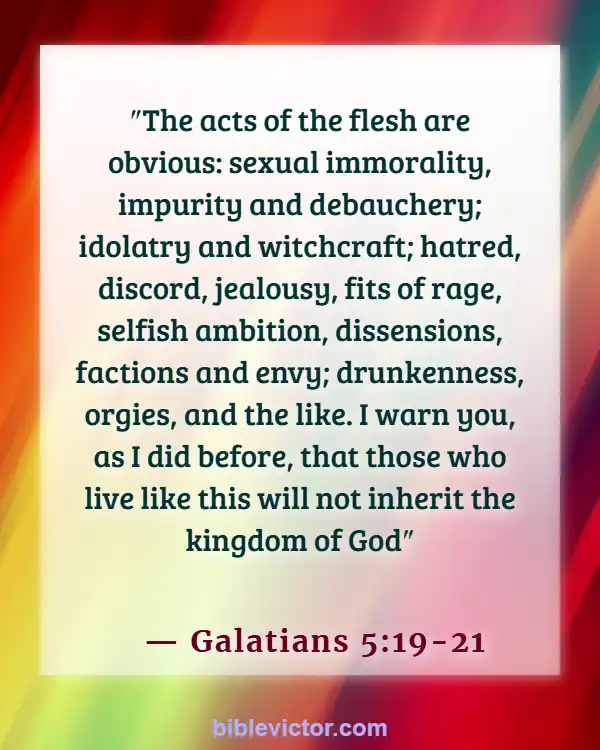
The acts of the flesh are obvious: sexual immorality, impurity debauchery; idolatry witchcraft; hatred, discord, jealousy, fits of rage, selfish ambition, dissensions, factions envy; drunkenness, orgies, the like. I warn you, as I did before, that those who live like this will not inherit the kingdom of God
Galatians 5:19-21
Galatians 5:19-21 lists acts of sinful nature, including drunkenness, as barriers to inheriting God’s kingdom. While not condemning alcohol outright, it warns against excessive consumption leading to sinful behavior.
Luke 21:34 – Beware of life’s distractions
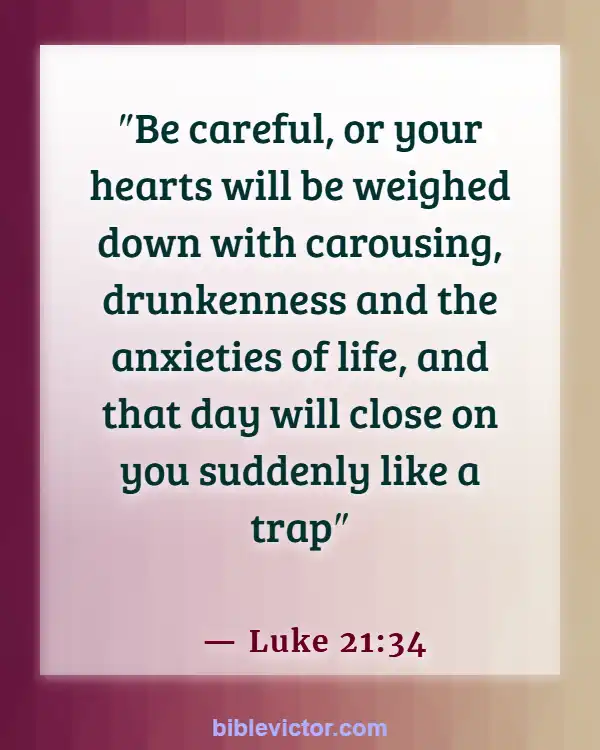
“Be careful, or your hearts will be weighed down with carousing, drunkenness the anxieties of life, that day will close on you suddenly like a trap
Luke 21:34
Luke 21:34 warns against life’s distractions, including overindulgence. While not explicitly about alcohol, it urges vigilance and self-control, reminding believers to remain spiritually alert and avoid behaviors that can lead them away from faith.
Biblical Warnings Against Drunkenness and Excess
The Bible is clear in its warnings against drunkenness and excess. It’s not just about the act of drinking, but how it affects our lives and relationships. Excess can lead us away from clarity and purpose, clouding our judgment. These verses remind us to stay grounded and mindful, keeping our lives in balance. Let’s see what the Bible has to say.
Proverbs 23:20-21 – Avoid drunkenness and gluttony
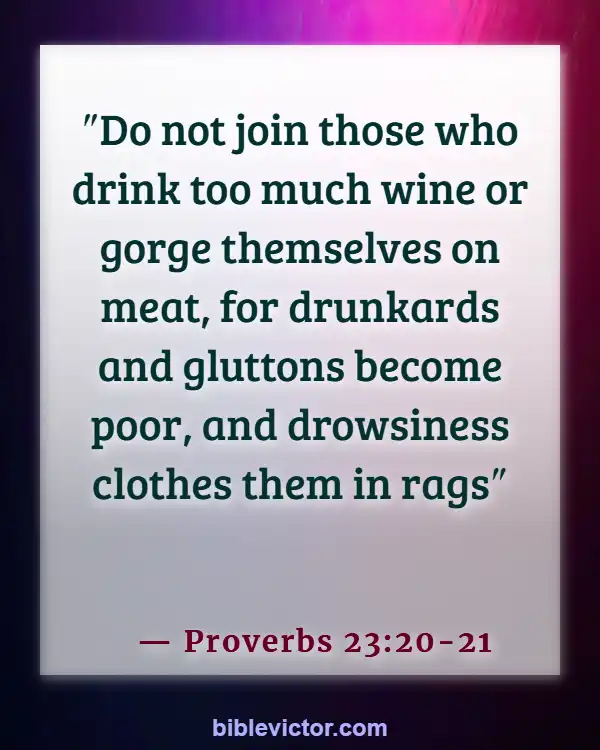
Do not join those who drink too much wine
or gorge themselves on meat,
for drunkards gluttons become poor,
drowsiness clothes them in ragsProverbs 23:20-21
Proverbs 23:20-21 warns against excessive drinking and overeating, highlighting the consequences of such behaviors. It calls for moderation and self-control, emphasizing that indulgence can lead to poverty and a loss of discipline.
Galatians 5:21 – Drunkenness bars kingdom inheritance
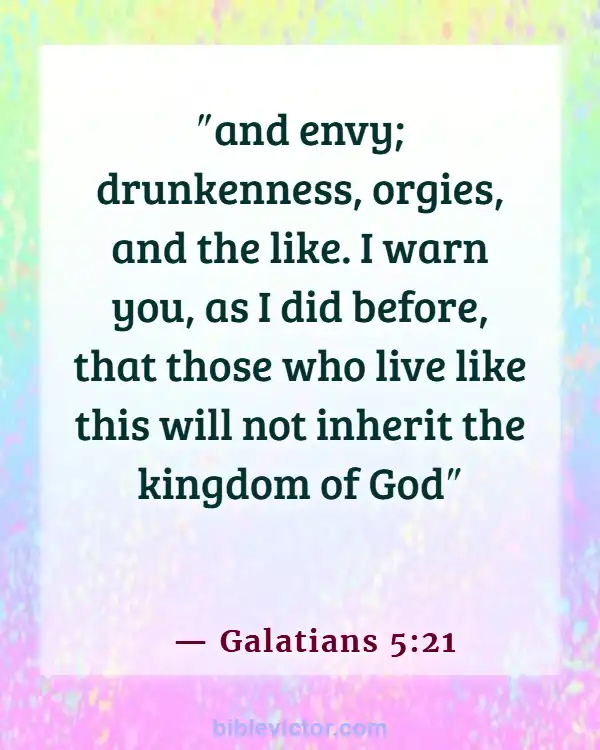
Envy; drunkenness, orgies, the like. I warn you, as I did before, that those who live like this will not inherit the kingdom of God
Galatians 5:21
Galatians 5:21 warns that drunkenness and excess can prevent inheriting God’s kingdom, highlighting the importance of self-control and moderation. The verse serves as a caution against letting alcohol lead to destructive behaviors.
1 Peter 4:3 – Past excesses and drunkenness condemned

For you have spent enough time in the past doing what pagans choose to do—living in debauchery, lust, drunkenness, orgies, carousing detestable idolatry
1 Peter 4:3
1 Peter 4:3 warns against past behaviors of excess and drunkenness, urging believers to abandon such lifestyles. It highlights the importance of living righteously and avoiding actions that lead to moral and spiritual decline.
Isaiah 5:11 – Woe to early drinkers
Woe to those who rise early in the morning
to run after their drinks,
who stay up late at night
till they are inflamed with wineIsaiah 5:11
Isaiah 5:11 warns against those who start drinking early in the day, highlighting the dangers of excessive alcohol consumption. This verse serves as a caution against allowing alcohol to lead to debauchery and neglect of responsibilities.
Habakkuk 2:15 – Woe to intoxicating others
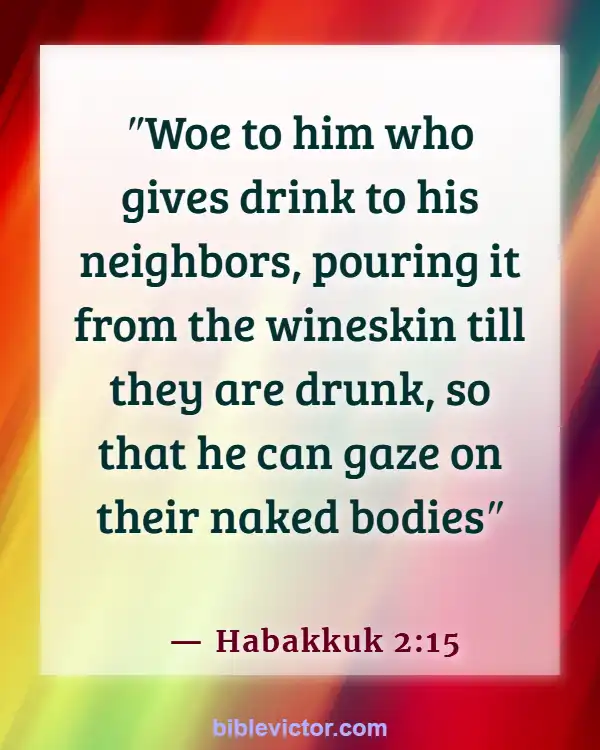
“Woe to him who gives drink to his neighbors,
pouring it from the wineskin till they are drunk,
so that he can gaze on their naked bodiesHabakkuk 2:15
Habakkuk 2:15 warns against leading others into drunkenness, highlighting the moral responsibility to avoid causing harm through excessive alcohol consumption. It underscores the broader biblical caution against indulging in behavior that leads to moral compromise.
1 Corinthians 6:10 – Drunkards won’t inherit God’s kingdom
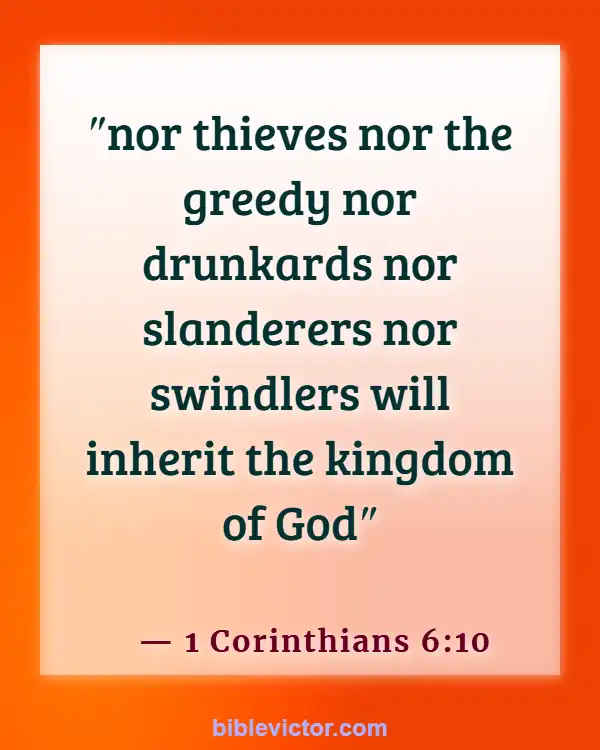
Nor thieves nor the greedy nor drunkards nor slanderers nor swindlers will inherit the kingdom of God
1 Corinthians 6:10
1 Corinthians 6:10 warns that those who engage in drunkenness will not inherit God’s kingdom. This verse highlights the spiritual dangers of excessive alcohol consumption and encourages believers to practice moderation and self-control.
Positive References to Wine in the Bible
Wine is often associated with celebration and blessing in the Bible. It’s seen as a gift that enhances joy and fellowship. These verses highlight the positive role wine can play when enjoyed responsibly. It’s a reminder of the abundance and goodness in life, meant to be appreciated and shared. Let’s explore these uplifting references together.
Ecclesiastes 10:19 – Wine brings joy to life
A feast is made for laughter,
wine makes life merry,
money is the answer for everythingEcclesiastes 10:19
Ecclesiastes 10:19 highlights wine’s role in bringing joy and celebration to life. This verse reflects a positive view of wine, suggesting it can enhance merriment and enjoyment when used in moderation.
Song of Songs 1:4 – Love and celebration with wine
Take me away with you—let us hurry!
Let the king bring me into his chambersWe rejoice delight in you;
we will praise your love more than wineHow right they are to adore youSong of Songs 1:4
Song of Songs 1:4 highlights themes of love and joy, where wine symbolizes celebration and intimacy. This verse reflects positive associations with wine, depicting it as a part of joyous gatherings and romantic expressions.
Isaiah 25:6 – Divine feast with fine wine
On this mountain the Lord Almighty will prepare
a feast of rich food for all peoples,
a banquet of aged wine—
the best of meats the finest of winesIsaiah 25:6
Isaiah 25:6 highlights God’s promise of a divine feast, featuring rich food and fine wine. This verse positively references wine, symbolizing abundance and celebration in God’s kingdom, reflecting joy and divine provision for His people.
Amos 9:14 – Abundant blessings include wine
I will bring my people Israel back from exile“They will rebuild the ruined cities live in them.
They will plant vineyards drink their wine;
they will make gardens eat their fruitAmos 9:14
Amos 9:14 highlights God’s promise of restoration and abundance, where wine symbolizes joy and prosperity. This verse reflects the positive aspects of wine in the Bible, representing God’s blessings and the flourishing of His people.
Genesis 27:28 – Abundance of grain and wine
May God give you heaven’s dew
earth’s richness—
an abundance of grain new wineGenesis 27:28
Genesis 27:28 highlights the blessing of abundance, including grain and wine, symbolizing prosperity and divine favor. This verse reflects the positive view of wine in the Bible as a symbol of joyful and abundant life.
Deuteronomy 14:26 – Enjoy wine in celebration
Use the silver to buy whatever you like: cattle, sheep, wine or other fermented drink, or anything you wish. Then you your household shall eat there in the presence of the Lord your God rejoice
Deuteronomy 14:26
Deuteronomy 14:26 encourages enjoying wine in celebration, highlighting its positive role in joyful gatherings and worship. This verse illustrates how wine can be part of a thankful and festive acknowledgment of God’s blessings.
Jesus and Alcohol: New Testament Perspectives
Jesus’ relationship with alcohol often sparks curiosity. The New Testament provides insights into how Jesus viewed wine, using it in his teachings and miracles. His actions and words provide a balanced perspective on alcohol, emphasizing joy and moderation. These scriptures show us how wine was part of Jesus’ ministry and message. Let’s delve into these passages for a clearer picture.
John 2:1-11 – Jesus turns water to wine
On the third day a wedding took place at Cana in Galilee. Jesus’ mother was there, Jesus his disciples had also been invited to the wedding. When the wine was gone, Jesus’ mother said to him, “They have no more wine.”“Woman, why do you involve me?” Jesus replied. “My hour has not yet come.”His mother said to the servants, “Do whatever he tells you.”Nearby stood six stone water jars, the kind used by the Jews for ceremonial washing, each holding from twenty to thirty gallonsJesus said to the servants, “Fill the jars with water” ; so they filled them to the brimThen he told them, “Now draw some out take it to the master of the banquet.”They did so, the master of the banquet tasted the water that had been turned into wine. He did not realize where it had come from, though the servants who had drawn the water knew. Then he called the bridegroom aside said, “Everyone brings out the choice wine first then the cheaper wine after the guests have had too much to drink; but you have saved the best till now.”What Jesus did here in Cana of Galilee was the first of the signs through which he revealed his glory; his disciples believed in him
John 2:1-11
In John 2:1-11, Jesus performs His first miracle by turning water into wine at a wedding in Cana, illustrating His divine authority and suggesting a nuanced perspective on alcohol, emphasizing moderation and celebration within a spiritual context.
Matthew 11:18-19 – Jesus criticized for eating, drinking
For John came neither eating nor drinking, they say, ‘He has a demon.’ The Son of Man came eating drinking, they say, ‘Here is a glutton a drunkard, a friend of tax collectors sinners.’ But wisdom is proved right by her deeds.”
Matthew 11:18-19
Matthew 11:18-19 highlights criticism Jesus faced for his social interactions, contrasting him with John the Baptist. Jesus is accused of being a “glutton and drunkard,” illustrating differing societal expectations and perceptions of righteousness regarding alcohol.
Luke 7:33-34 – Jesus accused of indulgence
For John the Baptist came neither eating bread nor drinking wine, you say, ‘He has a demon.’ The Son of Man came eating drinking, you say, ‘Here is a glutton a drunkard, a friend of tax collectors sinners.’
Luke 7:33-34
In Luke 7:33-34, Jesus highlights the hypocrisy of His critics, who accuse John the Baptist of austerity and Himself of indulgence, illustrating the tension between societal expectations and spiritual truth regarding alcohol consumption.
Mark 14:23-25 – Jesus shares wine at Last Supper
Then he took a cup, when he had given thanks, he gave it to them, they all drank from it“This is my blood of the covenant, which is poured out for many,” he said to them. “Truly I tell you, I will not drink again from the fruit of the vine until that day when I drink it new in the kingdom of God.”
Mark 14:23-25
Mark 14:23-25 describes Jesus sharing wine with His disciples at the Last Supper, symbolizing His blood and the new covenant. This passage highlights the use of wine in spiritual practices, reflecting a reverent perspective on alcohol.
Balancing Christian Freedom and Responsibility with Alcohol
Christian freedom is a beautiful gift, but it comes with responsibility. The Bible encourages us to make choices that reflect our faith and values, including how we handle alcohol. It’s about finding harmony between enjoying freedom and living thoughtfully. These verses guide us in making decisions that honor God and respect ourselves and others. Let’s explore this balance together.
1 Corinthians 8:9 – Exercise freedom with responsibility
Be careful, however, that the exercise of your rights does not become a stumbling block to the weak
1 Corinthians 8:9
1 Corinthians 8:9 reminds believers to exercise their freedom responsibly, especially regarding alcohol. While Christians have the liberty to make personal choices, they must ensure their actions don’t lead others astray or cause them to stumble.
Romans 14:16-17 – Prioritize God’s kingdom over disputes
Therefore do not let what you know is good be spoken of as evil. For the kingdom of God is not a matter of eating drinking, but of righteousness, peace joy in the Holy Spirit
Romans 14:16-17
Romans 14:16-17 urges believers to prioritize God’s kingdom over personal disputes, emphasizing righteousness, peace, and joy in the Holy Spirit rather than focusing on debatable issues like alcohol consumption, fostering unity and responsibility in Christian freedom.
1 Corinthians 6:12 – Freedom in Christ, exercise wisely

“I have the right to do anything,” you say—but not everything is beneficial. “I have the right to do anything”—but I will not be mastered by anything
1 Corinthians 6:12
1 Corinthians 6:12 teaches us that while we have freedom in Christ, not all actions are beneficial. When it comes to alcohol, we must exercise our freedom wisely, ensuring it does not lead to harm or control us.
Galatians 5:13 – Serve others with love, not indulgence
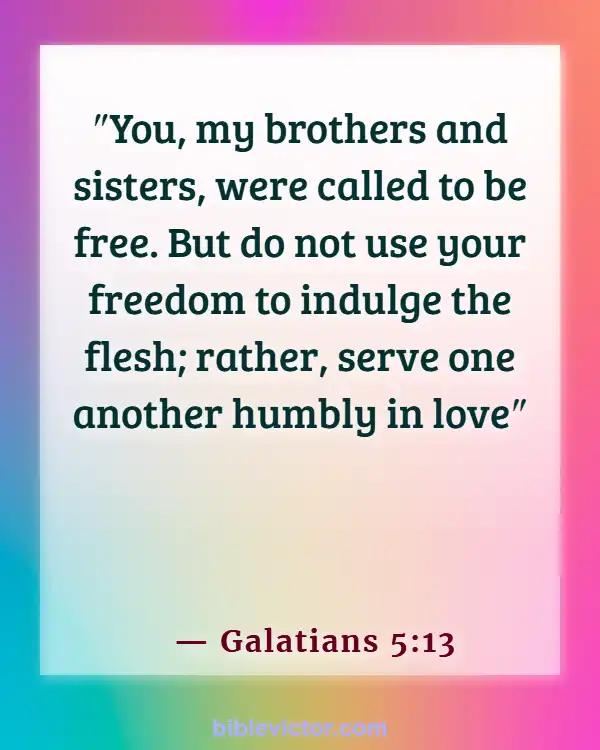
You, my brothers sisters, were called to be free. But do not use your freedom to indulge the flesh; rather, serve one another humbly in love
Galatians 5:13
Galatians 5:13 emphasizes using Christian freedom responsibly. While believers are free, they shouldn’t indulge in excess, like overconsumption of alcohol. Instead, they should serve others with love, reflecting their faith through self-control and compassion.
1 Peter 2:16 – Freedom with responsibility
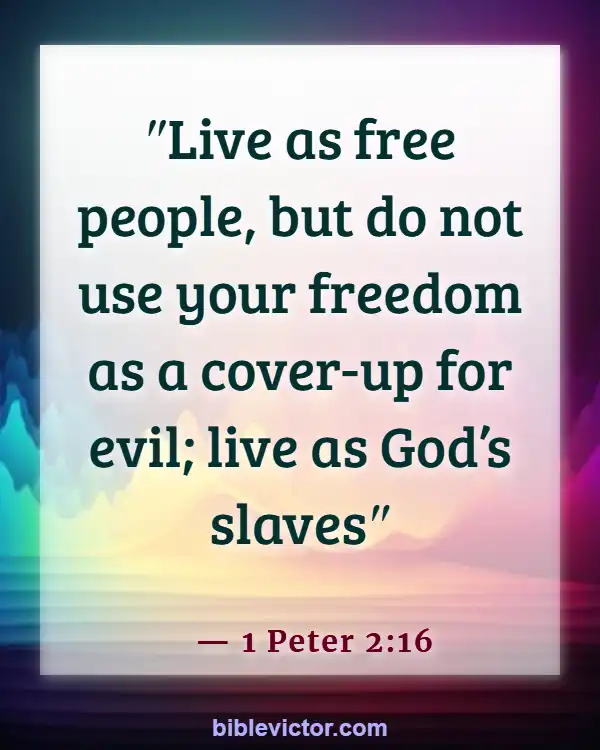
Live as free people, but do not use your freedom as a cover-up for evil; live as God’s slaves
1 Peter 2:16
1 Peter 2:16 highlights the importance of using freedom responsibly. In the context of alcohol consumption, it reminds Christians to exercise their liberty without compromising their moral responsibilities or leading others astray.

